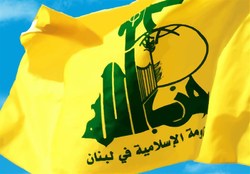 Lebanese President Michel Aoun told has told US Secretary of State Mike Pompeo that the Lebanese resistance movement, Hezbollah, has a popular support in the country.
Lebanese President Michel Aoun told has told US Secretary of State Mike Pompeo that the Lebanese resistance movement, Hezbollah, has a popular support in the country. RNA - "Preserving national unity and civil peace is a priority for us," Aoun told Pompeo, the Lebanese presidency said on its Twitter feed.
Pompeo met with Aoun at the presidential palace in Baabda, east of the capital Beirut on Friday.
The visiting top US diplomat claimed that his pressure on Iran and Hezbollah was working and urged Lebanon to stand up to the resistance movement which he accused of "terror and threats.”
"Our pressure on Iran is simple. It's aimed at cutting off the funding for terrorists and it's working," he said in a statement after meeting Lebanese political leaders. "We believe that our work is already constraining Hezbollah's activities."
During a joint news conference with Lebanon's Foreign Minister Gebran Bassil, Pompeo called on Lebanon to pick a side.
"Lebanon and the Lebanese people face a choice: bravely move forward as an independent and proud nation or allow the dark ambitions of Iran and Hezbollah to dictate your future," he said.
'Hezbollah is not a terrorist group'
Bassil stood side by side with Pompeo at the new conference but he rejected the terrorist denunciation of the US official for Hezbollah.
Bassil said he held "constructive and positive talks" with Pompeo but added that their were differences of perspective with regards to Hezbollah.
"Hezbollah is a Lebanese party, not a terrorist group, and it enjoys a wide popular base," he said.
"We don't want our ties with America to be affected and we want to work together to solve problems, including the issue with Hezbollah," he said.
'Hezbollah sanctions hurt Lebanon'
Earlier, the long-serving speaker of Lebanon's parliament, Nabih Berri, told Pompeo that American sanctions against Hezbollah were having a "negative impact on Lebanon and the Lebanese.”
Nabih Berri told the top US diplomat in a meeting in Beirut that Hezbollah is a Lebanese political party whose members are in the government and parliament, and that it is carrying out “resistance” against Israel to free Lebanese territory from Israeli occupation.
Earlier in the day, Pompeo also met with Lebanese Prime Minister Saad Hariri at the Grand Serail, which is the headquarters of the Prime Minister of Lebanon.
The US secretary of state on Thursday declared he would be "very clear" in his meetings in the Lebanese capital that "Lebanon's success depends on the Lebanese people (demanding) that a terrorist organization not be in control of their government and not drive policies.”
“Hezbollah is a terrorist organization. You ask how tough I am going to be? It is a terrorist organization. Period. Full stop,” Pompeo said in the Israeli-occupied Jerusalem al-Quds on Thursday, before leaving for ebanon.
“We’ll spend a lot of time talking with the Lebanese government about how we can help them disconnect from the threat that Iran and Hezbollah present to them,” Pompeo told reporters earlier this week.
Washington claims that the Lebanese resistance movement condones terrorism despite the fact that Hezbollah has been involved in a fierce fight against Takfiri terror groups, including Daesh and al-Nusra Front, thus preventing the spillover of the militancy gripping neighboring Syria into Lebanon.
Hezbollah has also supported the Syrian army in its fight against foreign-sponsored terrorists, who have been wreaking havoc in the Arab country since March 2011.
However, Washington has for long accused Hezbollah of being behind the 1983 bombing attack, in which 241 US Marines were killed.
In October, the administration of President Donald Trump imposed a new round of sanctions on the movement, targeting individuals and international organizations that do business with the group.
The sanctions legislation Trump signed is known as the Hezbollah International Financing Prevention Amendments Act 2018.
Hezbollah was founded in the 1980s following the Israeli invasion and occupation of southern Lebanon. The movement waged a long resistance campaign against Israeli forces and pushed them out of southern Lebanon in May 2000. Since then, the group has grown into a powerful military force. Israel also suffered a humiliating defeat from Hezbollah in the 2006 war.
Since its inception in 1985, the Lebanese resistance movement has been a thorn in the side of Israel and its foreign backers, including the United States.
847/940